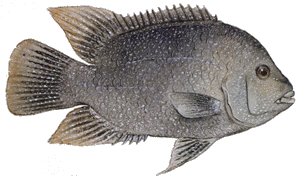Rio Grande Cichlid (Herichthys cyanoguttatus)
- Other Names
- Rio Grande Perch, Texas Cichlid
- Description
- The Rio Grande cichlid is a native member of the Cichlid family of fishes, which also includes the exotic tilapia. The word cyanoguttatus is Greek and means "blue spotted." Rio Grande cichlid are distinctive in that they exhibit cream and turquoise colored spots, giving them a speckled look. Background color varies from very dark to light olive. Lighter colored specimens usually exhibit five dark vertical bars. Both dorsal and anal fins are long and tapered extending behind the caudal peduncle (fleshy portion of the tail). Unlike tilapia and most sunfishes, which typically have three spines on the anal fin, Rio Grande cichlids are equipped with five to six anal fin spines. Adult males may also develop a pronounced "hump" on the head which is not present in tilapia. These fish may grow to exceed 10 inches in length.
- Life History
- Like most of its family, the Rio Grande cichlid is generally considered a warm-water fish, and is very sensitive to cold. In general, this fish does not survive at water temperatures below 49°Fahrenheit. The species may do well in heated water, and in spring-fed waters with constant favorable temperatures. Spawning occurs in early spring. Both parents protect their young, which feed primarily on small fish, insects and crustaceans. Adults are also known to consume large quantities of fish eggs when they are available.
- Distribution
- The distribution of the Rio Grande cichlid in Texas appears to have originally been limited to the lower reaches of the Rio Grande. However, a number of populations have been established in river drainages of Central Texas' Edwards Plateau including the San Marcos, Guadalupe, San Antonio and Colorado rivers. Minimum temperature tolerances in the Colorado River have been measured at 57-66°F.
- Other
- The Rio Grande cichlid is a fine fighter, and easily caught. It is considered good table fare. The Texas state record was caught at Lake Dunlap in 2011 and weighed 2.02 pounds.
